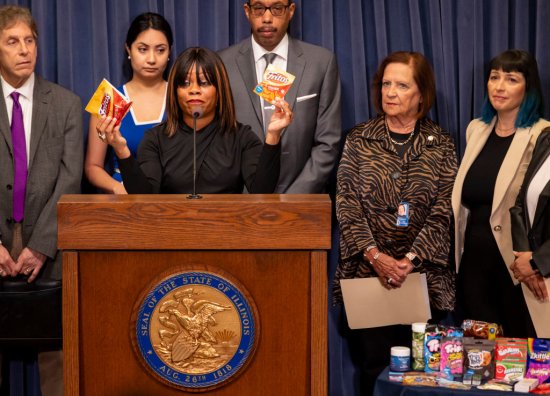
The FDA and FTC issued warning letters to five companies for illegally selling copycat food products containing delta-8 THC.
Five companies were issued warnings by federal officials for illegally selling food products containing a potentially dangerous drug in packaging that closely resembles popular national brands loved by kids and adults alike.
The U.S. Food and Drug Administration (FDA) and the Federal Trade Commission (FTC) issued warning letters to Hippy Mood, Earthly Hemps, Shamrockshrooms.com, Mary Jane’s Bakery Co. LLC, and Life Leaf Medical CBD Center, according to a press release published by the FDA on Tuesday. Separately, the FDA issued a warning letter to another company, GrowGod LLC, for also introducing food products containing delta-8 THC into the marketplace, in violation of the Federal Food, Drug, and Cosmetic Act. The warning letters are part of the FDA and FTC’s joint initiative to reprimand companies that sell illegal copycat food products containing delta-8 THC.
[time-brightcove not-tgx=”true”]Delta-8 THC is a cannabis compound. THC is the main psychoactive ingredient that’s in marijuana—it produces the “high” associated with smoking or ingesting marijuana. Because delta-8 THC isn’t found in significant amounts in the cannabis plant, concentrated amounts of it are usually manufactured from CBD, according to the FDA. The FDA said in its press release that it’s concerned that there may be impurities or variations in the composition process, which could lead to products that may be harmful or have unpredictable effects on people who consume them.
“Inadequate or confusing labeling can result in children or unsuspecting adults consuming products with strong resemblance to popular snacks and candies that contain delta-8 THC without realizing it,” FDA Principal Deputy Commissioner Namandjé Bumpus said in the press release. “As accidental ingestion and/or overconsumption of delta-8 THC containing products could pose considerable health risks, the companies who sell these illegal products are demonstrating complete neglect for consumer safety.”
The FDA said that packaging that includes brand names, logos, or pictures that are similar to popular snack food brands can make the delta-8 THC products “almost indistinguishable from many popular snacks,” which can be confusing for the public. The FDA said that these copycat food products containing delta-8 THC are especially worrisome because they’re easy to buy and are often available to young people.
Previously, the FDA had warned the public about the risk of children accidentally consuming food products that contain delta-8 THC. Between Jan. 1, 2021 and Dec. 31, 2023, the agency received more than 300 reports of children and adults who ate delta-8 THC products and experienced adverse reactions, such as hallucinations, vomiting, tremor, anxiety, dizziness, confusion, and loss of consciousness, according to the press release. Nearly half of those 300 reports involved hospitalization or emergency department visits, and about two-thirds of the reports came after the individual ate food products, like candy or brownies, that contained delta-8 THC.
In July 2023, the FDA and FTC warned six companies for selling edible food products that contained delta-8 THC, but were packaged in a way that “could easily be confused for foods sold by popular national brands,” the FDA said. All six companies don’t have those products in stock anymore.
“Companies that market and sell edible THC products that are easily mistaken for snacks and candy are not only acting illegally, but they are also putting the health of young children at risk,” Samuel Levine, director of the FTC’s Bureau of Consumer Protection, said in the press release. “Those that prioritize profits in front of children’s safety are at serious risk of legal action.”
The FDA said it has requested written responses from the companies within 15 business days. The responses must include how the companies will address the violations and prevent them from happening again. The FDA said that if the companies don’t “promptly address the violations,” officials may take legal action, such as seizing the products.
Get alerts on the biggest breaking news stories here